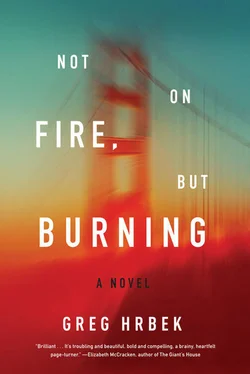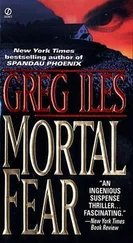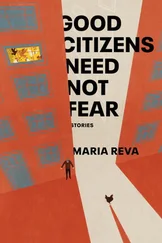“His behavior,” the woman says, “is inexcusable.” And as she goes on to explain that she is the leader of the youth group at Masjid al-Islam in the capital, and that what her son and the other boys did is completely contrary to the mission of the group, which is to promote not fisticuffs between children of different backgrounds, but rather understanding, Kathryn is experiencing a feverish flush of humiliation. In this woman’s place of worship is where Dorian wrote those words.
“Ms. Mahfouz.”
“Yes.”
“My son is Dorian Wakefield. Is that a familiar name?”
“It is, yes.”
(Silence) … While in the house above the bay, overlooking the water and the bridge, Noah is saying: Mesopotamia with a hotel, five hundred. Dorian turns away from the window to the boy, whose facial features are enough like his own to give the sense, as he speaks, that he is speaking to himself. I’ll pay the rent, he says, if you promise to not look out the window. With two fingers, Noah makes a peace sign. Then Dorian feels a realization: The money is in the other room. The one where his sister writes. Wait here, he says. Then he goes into the other room. From there, the scene outside is more frightening because the window is much larger. Skyler is at the table. Watching the spaceship: a silver disc of unbelievable diameter and circumference that appears to be spinning on a central axis as it hovers above the two towers of the bridge. In the last dream, he made a mistake. He waited too long and then it happened. Now he can feel a vibration in his mind meaning: Say her name. To say it is to slow the spinning of everything, from the planets in their solar orbits to the thoughts in the vortex of your mind.
Skyler …
She turns to him, and looks at him, her eyes saying: I know you, even in worlds where we never met.
Now he notices the computer on the table; and on the screen, the photo of his parents and his brother on the beach, which he understands to be composed not of pixels but of all the words she has been writing. The picture is the story. In the sky above the bridge, the spaceship is turning again, faster and faster. Before it happens … His thought only complete when she completes it. By laying her fingers on the laptop. Pressing a key. Holding it down while pressing a second. Operation invoked. As a new window appears, she says: I’m saving it to the cloud.
While that digital photograph from Path M 50— M 50was becoming a consequent in pathways including, but not limited to, B 39— R 61, Kathryn Wakefield and Fawzia Mahfouz were speaking of forgiveness and reconciliation, teachable moments, and a lesson their children would carry into the future. After the conversation, Kathryn opens her Lifebook page. To find the friend request — and an image of the woman to whom she has just spoken: a smile showing white teeth; eyes like black pearls. Later that same afternoon, Dorian gets an e-mail that reads (in part): YOURE NOT A ARYAN OR YOU WOULDNT HAVE EVEN COME … I WAS A MAJOR DICK … SINCERELY OMAR MAHFOUZ.
With these words echoing in his mind, he goes to the garage and takes out the lawn mower. Inserts the battery, turns the key, starts pushing. The drone of the engine cannot drown out the chorusing of the insects, which are not only in the trees, but in the grass. Nothing to do but go over them. The dream seems so fresh, almost like a wet painting. He thinks of it and something — not color, but a kind of pigment — is left on his mind. The spaceship, for instance; the blur of its spinning hull. He had read, just a few days ago, on some web portal, that theories of alien responsibility, which have always occupied a middle ground between the explicable and the supernatural, are becoming more prevalent — that nearly one in five Americans now believes that 8-11 was an act of “extraterrestrial terrorism.” Pushing the mower forward, stopping at the property line, reversing direction, Dorian thinks: What if. If that’s what really happened, then what about the internment camps and the drone strikes (if there ever were any)? Suddenly, the mower stalls out. The battery is dead. Has he really been turning these thoughts over in his brain for a whole hour? He carries the bag of clippings into the woods by the gazebo. Mixed in with the grass: the body parts of cicadas, some cleanly severed, others mucked with what belongs inside. Then he sees one moving. Alive and whole. Drawn like the others into the updraft of the whirling blade, but miraculously spared the violence of it.
So the sheikh was correct. Of course correct. As everything he has ever said to you and your friends was true. How could it be otherwise? How could a messenger of the Almighty speak anything but the truth? And yet you. You listened to another voice. Chose to listen to a voice that said: Why call the number today? What’s the rush? What is one more day in the scheme of eternity? Heaven isn’t going anywhere, is it? How clever that voice was. To not issue commands. Only to pose questions. And not even in words, but in the form of hot food, a soft bed, a cool pool of water … Well, what is so wrong with food and a bed and water? Wouldn’t your mother and father want you to have these things? Didn’t they speak, often, of how the internment would end some day, some day soon — and you would all return together to a life in the real world? (He is holding the eyeglasses.) And it did end, and here you are. Without us, I know (the voice his mother’s now), without me, I know, but yesterday you had friends — friends, habibi — and even that boy so unlike you, with skin unlike yours and a history so different. Even he. I understand why you hurt him. And, of course, of course, I want to be with you, also. But think. Think, Karim —
“ Allahu Akbar …”
“ Allahu Akbar …”
It’s the muezzin calling him to sunset prayer. He turns the sound off, sets the eyeglasses on the desk.
Downstairs, the TV is tuned to a baseball game. The old guy on the couch. Asleep. The sportscaster saying: “ After one inning in Houston, Yankees 8, Colt.45s nothing .” Karim can see, through the bay window that looks over the front lawn and the road, that the boy is in his yard again, pushing the mower. He watches him steer the machine, moving it across the grass in straight parallel lines. The job almost finished. Perhaps a dozen more crossings from one end to the other. Karim watches him cross once, twice. Then, very suddenly, thinks to himself: I am going to whisper now. If the old guy wakes up, I go down and pray maghrib; if he stays asleep, I go across the road .
“Jaddi.”
Not a muscle in the sun-browned face so much as twitches. As Karim steps onto the patio and eases shut the sliding glass door, he can just hear the words: “ Top of the second, heart of the Yankee order coming up …”
Time of a summer evening when the world is being downsampled toward grayscale. The air cooling, a change that seems to be caused less by the setting of the sun than by the fading of color; and the legions of cicadas falling silent, as if color was the thing driving them mad and making them scream. His mother told him to think: words not from beyond the grave, but from a current of mother-talk that moves like constant water through the mind, carving out ideas and shaping beliefs. Unsure at first what she meant, beyond a caution to think twice, think carefully before taking actions that can’t be taken back. But now, turning the corner of the house, Karim Hassad is thinking (insofar as acting is a form of thought), that perhaps one must know not only what to do, but also when to undo actions that can be undone. He walks down the slight grade of the driveway, the nerves in the soles of his feet sensing that the asphalt is still warm … Dorian doesn’t see him coming. His eyes are fixed on the last line drawn in the grass by the lawnmower, which is getting harder to discern as the light slips away. Then all of a sudden the kid is standing there, like something pasted from another window into a destination image. He startles and lets go of the bail bar. The engine dies, the wheels stop turning; and there they are, facing one another in the gloaming.
Читать дальше












